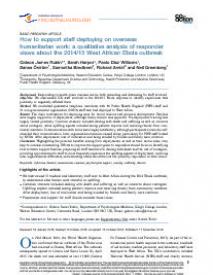How to support staff deploying on overseas humanitarian work : a qualitative analysis of responder views about the 2014/15 West African Ebola outbreak
Background: Responding to health crises overseas can be both rewarding and distressing for staff involved.
Objective: We interviewed UK staff involved in the 2014/15 Ebola response to identify experiences that positively or negatively affected them.
Method: We conducted qualitative telephone interviews with 30 Public Health England (PHE) staff and 21 non-governmental organisation (NGO) staff who had deployed to West Africa.
Results: The main motivations for deploying were for moral reasons and personal development. Families were largely supportive of deployment, although family tension was apparent. Pre-deployment training was largely viewed positively. Common stressors included dealing with death and suffering as well as concerns about contagion, while uplifting aspects included seeing patients improve and receiving thanks from community members. Communications with home were largely satisfactory, although participants commonly self-censored their communication. Inter-organisational tensions caused stress, particularly for PHE staff hosted by NGOs. After deployment, loss of motivation and being avoided by friends and family were common.
Conclusion: Highlighting the personal benefits arising from deployments, as well as their moral value, may help to increase volunteering. Efforts to improve the support given to responders should focus on identifying how to better support families, preparing all staff members for dealing with death and the risk of contagion, providing opportunities for staff to more frequently experience the uplifting aspects of deployment, resolving inter-organisational difficulties, and educating others about the low risk posed by responders on their return.
In: European journal of psychotraumatology, ISSN 2000-8066 | 7 | [1] | 30933
http://dx.doi.org/10.3402/ejpt.v7.30933


